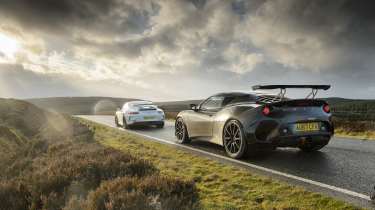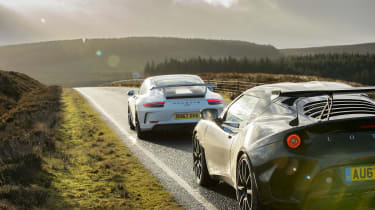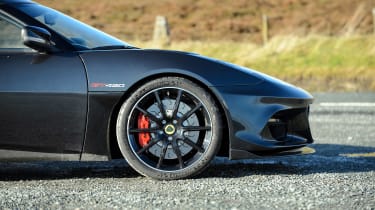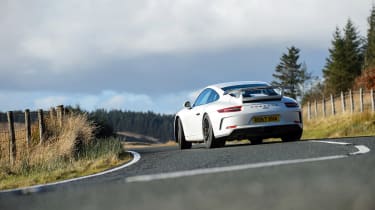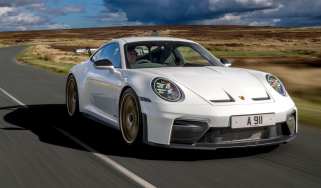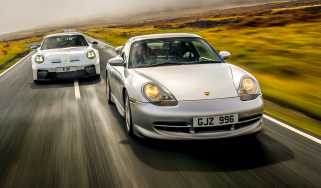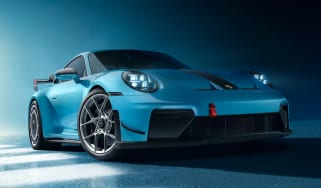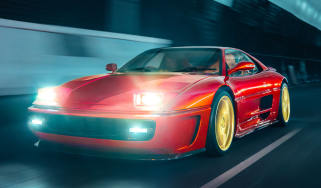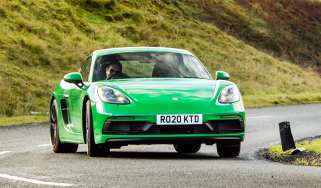Porsche 911 GT3 vs Lotus Evora GT430 - hardcore drivers' car showdown - Continued…
Is the fastest, most expensive road-going Lotus to come out of Hethel enough to oust the mighty Porsche 911 GT3 from its lofty perch?
The Porsche also has some options, bumping its price from a list of almost £112k to £130k. They include LED headlamps, front-axle lift, carbon-ceramic brakes, leather interior and those bucket seats. They’re fixed-back, like the Lotus’s, but with electric cushion height/tilt adjustment allowing the backrest angle to be trimmed. On the lowest setting it feels like you’re sitting on the floor but, as ever, the superb all-round visibility of the 911 helps put you at ease. In contrast, rear visibility in the Evora is compromised by the slatted engine cover and the lack of rear side windows, especially at oblique junctions.
Their power-to-weight ratios say the two cars should feel equally quick. The lighter Lotus weighs in with 336bhp per ton, the more potent Porsche packs 355bhp per ton, its naturally aspirated flat-six making 493bhp at 8250rpm. They do seem similarly rapid, but in different ways. The Evora’s delivery is punchier low down and overall more linear, its gutsy supercharged V6 really starting to push on at 4000rpm but then seemingly cut off in its prime by the abrupt limiter soon after 7000rpm. After a relatively less gutsy start, the 911 is also digging deep by 4000rpm and by 6000rpm is really starting to wind up. Just as the Evora engine heads for the buffers, the 911’s makes that magical, thrilling move of fully hitting its stride, crazily escalating both the power and the sound to 8000rpm and beyond. It’s electrifying, nape prickling, and for the full-on experience you need to hold it from tickover to 9000rpm in one gear.
We’ve mostly driven the 991.2 GT3 in PDK form, but the six-speed manual, as fitted here, makes for a better, more nuanced experience. Forays into the upper realms of the rev range are less frequent and more special because you lean on the engine’s torque more, when the PDK would have dropped a couple of cogs and ripped on to the red line. A beneficial side-effect is that you encounter the uncomfortable 7000rpm resonance less often. The shift is darned good, too. The Evora’s ’box has a lovely, positive, mechanical feel, but the 911’s feels tighter and even more slick, and the clutch weight feels more in harmony with the other controls.
> Find out what Lotus's most harcore Exige, the 380 Cup, is like to drive
In all cars, time behind the wheel allows you to acclimatise to their controls and foibles, then adapt to them. However, when you then swap into a car that has better control weights and more linearity of response, you notice right away. After the Evora, the GT3 is such a car. You can get into a satisfying groove with the Lotus, and there is much to enjoy and admire, not least the finesse displayed by its ride, which smooths away small imperfections and delivers great control over the bigger stuff for remarkably poised, calm progress, with fantastic grip, too.
Then you get into the Porsche and, although it’s not perfect, so much of it is so right, and it starts with the steering. It’s not as sharp as the Lotus’s but it’s connected and talkative and paints a clear picture of what’s happening that puts you at ease. Not so long ago, electric power steering, such as the 911 has, was judged inferior in feel to hydraulic power steering (now rare), which the Lotus has. This was certainly the case when the first generation 991 was new, but Porsche has been working hard on closing the gap. The sportiest 991s benefit from rear steering, sharpening initial response, but equally impressive and harder to deliver is detailed feedback. The GT3 has it in spades.
The next day starts frosty. You get a warm feeling being in the GT430; it’s the best built of all the Evoras I’ve tried, with such a reassuring sense of quality and integrity. However, heading east on the A5 out of Betws-y-Coed, up the twists between the stone walls, I’m feeling for icy patches, which again highlights the Lotus’s lack of feel. The weight, smoothness and directness of the steering are spot on, but it lacks that crucial amount of feedback that gives confidence. Further out, pressing on, the weighting becomes a fraction light and inputs reveal a light front, heavy rear balance of masses that tempers your pace a little.
Getting into the 911 again confirms this. Its steering is more natural, authentic – the response you get for the input you make is spot on. But it’s also the overall balance that makes a difference. The Porsche feels lower slung, and although its engine is way out back, it doesn’t feel like it; the car turns like all the masses are gathered between the axles. It’s quite some feat of engineering.
The contrast becomes even sharper through the wet bend we choose for some cornering shots. I take the GT3 first, which is in itself an indicator of confidence. I do a run with all the aids on, to sense the grip, then go again with ESC and TC off. The front catches the apex, the rear slips out under power, and I back out and neutralise. Next time through, I stay with the slip and hold the power steady for a few moments. It feels nicely poised, comfortable with the attitude; and you as the driver have control and options.
The Evora is, well, less good. In fact, all that has been hinted at over the miles we’ve covered crystallises here. First, the front doesn’t want to bite and the rear doesn’t want to let go, so next time through, I’m more patient and let the front hook into the turn and then power up the rear. It slips wide but the breakaway is too quick, too sudden. Back off and the momentum-loaded rear regains grip abruptly and the tail bounces back into line. Not smooth, not calm, not reassuring. This is much like the behaviour you’d expect of a full-scale mid-engined supercar. Sure, there’s a six-position traction control allowing you to dial in rear-tyre slip values between one and 12 per cent, but essentially the Evora does not feel as poised or balanced at or over the limit. In fact, the Lotus feels more like a 911 than the Porsche does.
What makes it more of a challenge is that lack of steering feel. Feelsome steering used to be one of the most rewarding aspects of the Evora, and the GT430 shows why it is so important. Without it, it’s difficult to feel the bite that the front has and thus what the rear might do if you push harder. And given that the balance isn’t there and the rear feels like the tail wagging the dog, that’s a crucial loss.
There are a few other aspects that rankle: the shut lines are large, as if drawn with a crayon, where the Porsche’s are drawn with a Rotring 0.5mm fine pen, and the ignition key and column stalks are inexpensive Ford parts, circa 1983.
That said, in many more important respects, this is a deeply impressive car. The standard of the carbonfibre work is very high, there’s a real sense of quality and integrity, and the engine and gearbox have character and purpose. And, as ever, the ride quality is exceptional and allied to superb body control.
In the end though, as with most other rivals that have strayed onto its patch, the GT3 comes out on top. It’s not as special to look at, it isn’t made from obviously exotic materials, it’s not as rare and it isn’t even the top of the 911 tree. It is also somewhat unobtainable, with significant premiums being sought right now.
Whether it’s worth almost £200k is debatable, but there’s no question it is a very finely honed, very satisfying drivers’ car. It has superb steering feel and thus gives a better sense of connection with the road at all times, but especially when you’re pressing on and feeling out the limits. And, against expectation, at and beyond the limit it is better balanced and more exploitable than the Evora. Equally importantly, though, the slick, short-throw shift of the manual gearbox transforms the experience compared with the PDK car, making it much more a tool of the driver rather than just a crazy-fast ride.
It takes the level of engagement to another plane, delivering rewards at all speeds, not just when the spectacular flat-six is keening for the 9000rpm red line, and ultimately helps ensure that the GT3 still sets the sports car standard.

